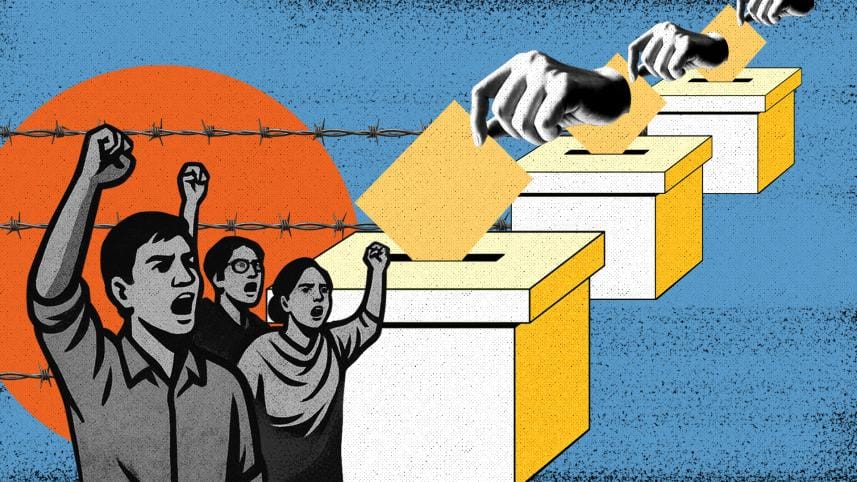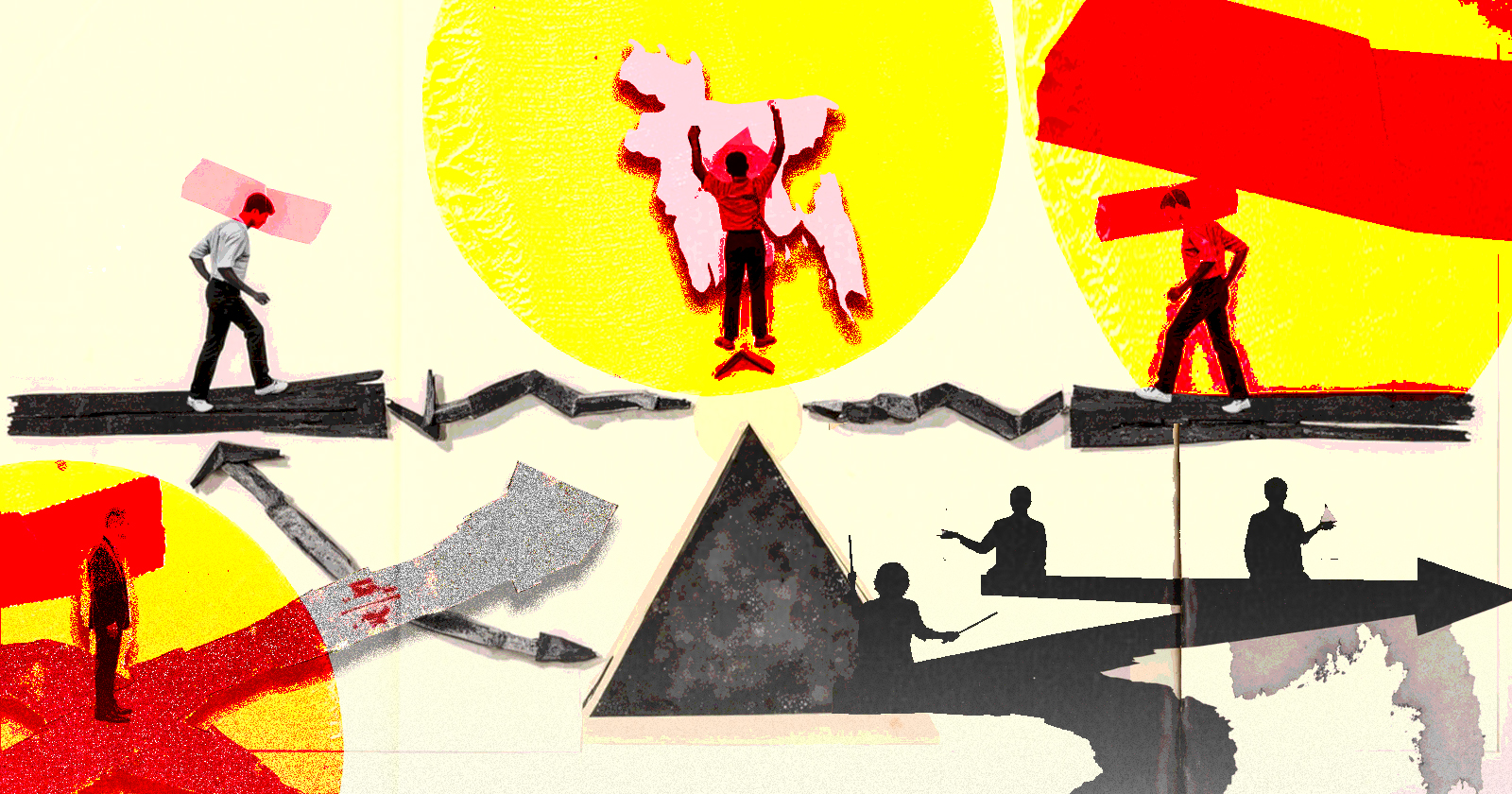February election: Democracy’s burning test

There comes a time in the life of every nation when the air grows thick with lies. A time when slogans and rumours, like soot from a factory chimney, cloud our sight until we no longer recognise our own reflection in the mirror. For Bangladesh, that time is now. The national election scheduled for February 2026 is not merely another turn of the political wheel; it is the test of whether our long-suffering republic still belongs to its people, or whether it has already been stolen by bureaucrats, backroom engineers, and their chosen political pets.
Let us not mince words: those who argue that elections can wait, that the people's voice can be deferred until reforms are completed or until the stars align, are consciously or otherwise hindering our democratic transition. Democracy is not a favour dispensed by a caretaker regime or a prize handed down. Democracy, in its most elemental form, is the ballot box—messy, imperfect, vulnerable to manipulation, yes, but the only mechanism through which sovereignty flows from people to government. Delay it, deny it, derail it, and you reveal yourself for what you are: not committed to democracy.
And yet, astonishingly, some are just showing that tendency. One party, birthed in the laboratory of the interim government, is implicitly claiming to be the sole heir of the July movement. Their leaders—young, articulate, photogenic—speak as though the revolution was theirs alone, as though millions of others who bled, suffered, and marched were mere extras in their scripted drama. This stance is of the most cynical kind. This is, however, not to discredit anybody but to put things in perspective.
To be frank, prominent leaders of this new party did not march to tear down Sheikh Hasina's dictatorship. They cut their teeth in the anti-quota movement, an agitation narrow in scope, focused on government jobs. They questioned Hasina's policy but did not seek her downfall, at least initially. One can say that their purpose was entry into the system, not its dismantling. To now allow such a party to monopolise the July uprising is an insult to history.
The July movement was not the triumph of any one group. It was, in Ernesto Laclau's words, a convergence, a tidal wave of anger where diverse grievances found a single nodal point: hatred for Hasina's tyranny. Students, farmers, workers, mothers, intellectuals, small parties, large parties, citizens with no party at all—all came together to tear down a dictatorship that had outstayed every welcome. To watch a party claim that legacy as its own is to stand by while truth itself is mugged in broad daylight.
The interim government and its chosen favourites now spin another fiction: that unless they stay in charge, the criminals of July will never face justice. Let us pause here. The parties most likely to win in the upcoming election are the very ones who were hounded, imprisoned, shot at, and vilified by the dictatorship that the movement toppled. Their leaders have tasted tear gas and prison bars. Their activists have carried their dead on their shoulders. Are we to believe that such parties, if chosen by the people, will suddenly shrug off the duty of justice?
Another myth whispered in diplomatic corridors and blared in compliant media is that elections will "derail" reforms. What reforms, one might ask? The major structural changes—consensus over judicial independence, acceptance of a bicameral parliament, institution of a national commission to oversee electoral finance—have already been hammered out in the dialogues conducted by the National Consensus Commission. What remains is not endless caretaker tinkering, but the people's verdict. A constitution, after all, is not a technocrat's report; it is a living covenant between the governed and those who govern. Until reforms are ratified through elections, they remain paper promises.
And then there is the chorus for proportional representation everywhere. Let us be clear: there are many electoral systems, and none are perfect. Bangladesh has already agreed to a hybrid system, with the Upper House chosen by proportional representation. This gives smaller parties the voice they crave, while preserving the constituency link of the first-past-the-post system in the Lower House. If some parties wish for a different system, that is their right, but to hold the entire electoral process hostage to such demands is unconscionable. Ranked choice voting, or single transferable vote, might be a more elegant system. But no party has asked for either. Instead, each party lobbies for the system that best serves its own interest. That is politics. What is not politics—what is sheer sabotage—is the insistence that unless one's preferred formula is imposed, elections themselves cannot proceed.
Most chilling of all is the open declaration by some leaders that they will not "allow" the February election to take place. Think about that. A political party now presumes the authority to veto the people's right to vote. This is not dissent. It is not a debate. It is imposing one's will dressed in revolutionary garb, an ultimatum to democracy itself.
The interim government, for all its moral pretensions, is in danger of losing its way. This cannot go on. The February election is not a procedural detail. It is the very heartbeat of the republic. It is the one remaining bridge between the sacrifice of July and the promise of tomorrow. Delay the election, and you betray the martyrs. Derail it, and you mock the millions who marched. Deny it, and you betray the very people of this nation.
Bangladesh is tired of lies. Tired of experiments carried out on its body politic by those who imagine themselves above the people. Tired of manufactured saviours and unelected custodians. In February, the people must speak. And their voice, fractured, noisy, contradictory, yet undeniably sovereign, will be the only mandate that matters.
Bobby Hajjaj is chairman of the Nationalist Democratic Movement (NDM) and a faculty member at North South University. He can be reached at bobby.hajjaj@northsouth.edu.
Views expressed in this article are the author's own.
Follow The Daily Star Opinion on Facebook for the latest opinions, commentaries and analyses by experts and professionals. To contribute your article or letter to The Daily Star Opinion, see our guidelines for submission.




 For all latest news, follow The Daily Star's Google News channel.
For all latest news, follow The Daily Star's Google News channel. 

Comments